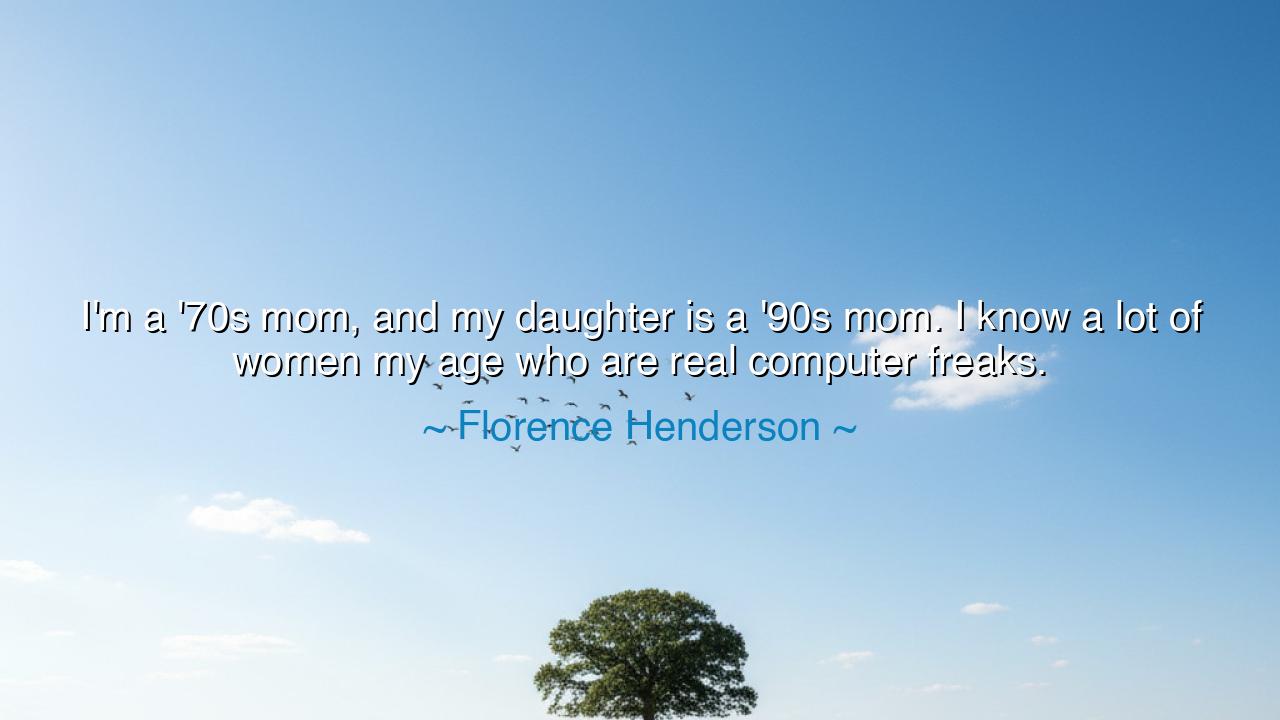
I'm a '70s mom, and my daughter is a '90s mom. I know a lot of
I'm a '70s mom, and my daughter is a '90s mom. I know a lot of women my age who are real computer freaks.






"I'm a '70s mom, and my daughter is a '90s mom. I know a lot of women my age who are real computer freaks." – Florence Henderson
In the vast and ever-changing tapestry of human experience, the passage of time often weaves together generations in ways that reveal the ever-evolving nature of society. Florence Henderson’s words speak to a profound truth about the march of progress and the generational divide that shapes our understanding of the world. Her reflection on the changing roles of mothers across the decades—herself a '70s mom and her daughter a '90s mom—reveals the evolving relationship that each generation has with technology and the world around them. It is a reminder of how every age comes with its own set of tools, challenges, and advancements, and how the women of each era adapt and shape those forces to build a new legacy.
The ancient world also recognized that each generation inherits its own knowledge and responsibilities. The ancient Greeks celebrated this cyclical progression through their concept of time, where each new generation built upon the wisdom of the previous one, but also forged its own path. Plato spoke of the role of education in shaping the minds of the young, ensuring that each generation was equipped to lead in its own time. Similarly, the mothers of the '70s were in the midst of a cultural revolution, an era where women were beginning to step into new roles in the workforce, while still maintaining their roles as caretakers and nurturers. Florence Henderson’s statement about being a ‘70s mom reflects the time when technology was beginning to change family dynamics, but the full extent of those changes was not yet fully realized.
By the time the '90s arrived, the world had transformed again. The personal computer had begun to infiltrate every home, offering mothers a new tool in the ever-expanding repertoire of family management. But with this came new challenges. The ‘90s moms were no longer simply responsible for the domestic sphere; they were now tasked with navigating a world where the internet, computers, and digital media were rapidly becoming the foundation of society. Florence Henderson acknowledges this transition in her words, recognizing that the technology her generation grappled with was vastly different from the tools that ‘90s moms—and even the generations after them—would come to know intimately. It was a shift in identity, as women adapted to the new demands of modern motherhood in a world increasingly dominated by technology.
Consider the tale of Socrates and his concerns about the advent of writing. The oral tradition of passing down knowledge was being replaced by the written word, which he feared would lead to the loss of true wisdom and critical thought. In a similar way, each generation has its own anxieties about the role of technology in shaping how we think, how we live, and how we raise our children. Just as the Greeks feared the written word would make the mind lazy, ‘70s moms may have initially feared the rise of digital technology, unsure of how it would affect the close-knit, face-to-face relationships that were once at the heart of family life. Yet, the ‘90s moms embraced these changes, adapting their roles to include not only the nurturing of their children but the navigation of an ever-advancing digital world.
In every era, the wisdom of the mothers is passed down, shaped by both the wisdom of the past and the demands of the present. Florence Henderson’s reflection is a testament to the adaptability of mothers, who are ever-evolving in their roles as nurturers, educators, and caretakers. But this evolution is not without its struggles. It is a reminder of how each generation must confront its own fears and uncertainties, while embracing the tools that help them navigate the world. The mothers of today are faced with an even greater challenge: how to raise children in a world dominated by screens and social media, where the very fabric of society is being redefined by technology.
The lesson here is one of adaptation and growth. Like the great philosophers of old, who sought to understand the changing nature of the world, we too must understand that every generation has its own unique challenges and opportunities. Technology, for all its complexities, is simply another tool that can be used to enrich our lives, so long as we approach it with awareness and intentionality. Just as ‘70s moms raised their children with the tools available to them, ‘90s moms did the same, and future generations will do the same with the tools that are yet to be invented. In this, the wisdom of the past and the future converge, reminding us that motherhood is not defined by the tools we use, but by the love, guidance, and nurturing we offer to the generations that follow.
So, as you navigate the changes in your own life, remember the lesson of the mothers across the ages: embrace the tools of your time, but always remain rooted in the timeless values of love, wisdom, and care. The legacy of motherhood is not bound by technology, but by the eternal truths of nurturing and teaching, passed down through generations. And in this way, each new era, with its own unique challenges, will be met with the strength and adaptability of the women who have always shaped the world through their love.






AAdministratorAdministrator
Welcome, honored guests. Please leave a comment, we will respond soon